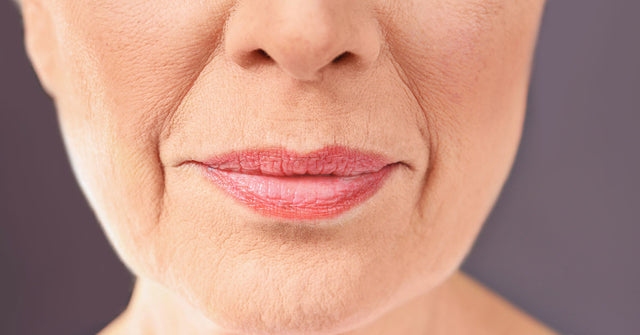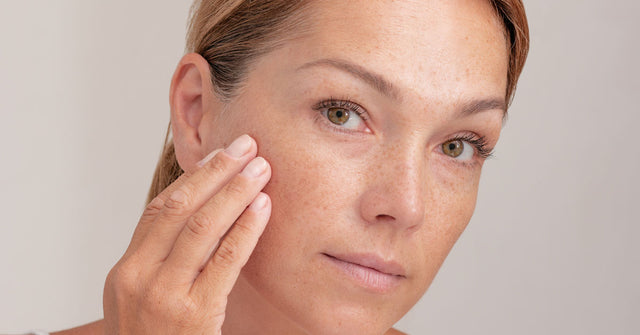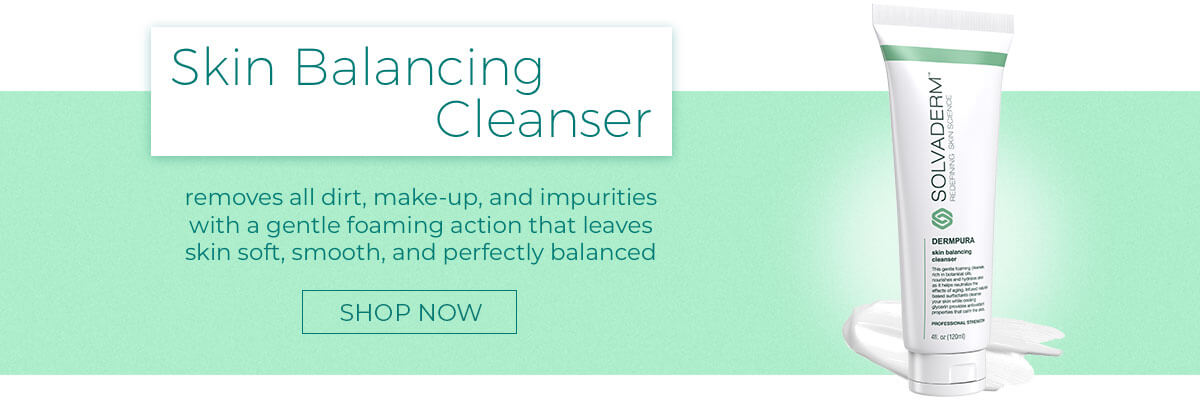What is Facial Eczema?
Eczema is a dermatological skin condition characterized by flaky, dry itchy skin. While it can appear all over the body, facial eczema is particularly difficult to manage as the skin is more vulnerable and open to environmental irritants. The condition disrupts the skin’s natural protective barrier, making it more susceptible to allergens, pollution, UV rays, and other harmful agents.
Some people develop an eczema rash on the face alone, while in other individuals the symptoms appear both on the face and on parts of the body like the hands, neck, arms, and legs. This condition can occur at any age, including in babies.
According to the National Eczema Association [1], 10.1% of U.S. citizens have some form of eczema, with the highest prevalence being in young children. Does eczema go away? While in many cases it’s not curable, it can usually be managed with treatment and good skincare.
What Are The Types of Facial Eczema?
Facial eczema can be subdivided into several different types, which have similar symptoms but differ somewhat in terms of where and why they appear. These 3 are the primary categories of eczema that occur on the face.
-
Atopic Dermatitis: This is the most common form of eczema, and it usually starts in childhood. The rash, itchiness, and discoloration most frequently appear as eczema on the forehead, chin, cheeks, and around the eyes and mouth. This type is not curable, but it is treatable with medication.
-
Contact Dermatitis: This condition is caused by an allergen or irritant that has come into contact with the skin, leading to an itchy rash, dry skin, bumps, or blisters. It can occur anywhere, including the face. Does eczema go away in this case? The condition may be either acute and curable or chronic but treatable.
-
Seborrheic Dermatitis: This is an eczema rash on the face caused by an inflammation of the sebaceous glands, often due to a yeast infection. Its symptoms include itchy, white, scaly patches and inflammation which can be easily treated, but may return.
Who Does Facial Eczema Affect?
Facial eczema is a skin condition that first appears in childhood or even infancy in most cases, and only rarely occurs for the first time in adults. Usually diagnosed before age 5, according to the National Center For Biotechnology Information [2] about 15% of children have eczema compared to 2-4% of adults.
While 80% of kids outgrow the condition over time, when eczema does occur in adults, it’s more common in women than in men [1]. In addition, people with allergies or asthma are more likely to get an eczema rash on the face.
What Causes Eczema on Your Face?
Researchers have yet to pinpoint one specific cause of facial eczema, but there are a number of risk factors and triggers for the condition. Genetics plays a key role, however, one research review [3] pointed out that eczema involves a combination of hereditary and environmental factors. Some of these include irritants, allergens, or even climate conditions.
Certain medical conditions increase your likelihood of developing an eczema rash on your face, including asthma, allergies, and autoimmune conditions. In addition, high levels of stress or fluctuating hormones may trigger eczema symptoms.
Eczema on the Face vs. the Body
Eczema can appear on the face or on the body, and the symptoms are basically the same: dry, patchy, itchy areas of skin, rash, inflammation, and possibly bumps or blisters. On the body, it most often develops on the hands, neck, and in the bends of your arms and legs.
On the face, you may see eczema on the forehead, cheeks, and chin most frequently, but it can also appear in other areas. The main difference is that the skin on your face is thinner and more vulnerable than on your body, and more exposed to environmental irritants.
Skin Care for Facial Eczema
If you have facial eczema, it’s particularly important that you follow a regular skincare routine using very gentle products free of allergens, artificial fragrances, or other irritants. Here are some essential tips to help control your condition and support a healthy complexion.
-
Moisturize: Keeping your skin hydrated is especially important if you have eczema on your face, so make sure to moisturize with Infusoderm in the morning and evening.
-
Clean gently: Use a gentle, hydrating, natural, non-irritating formula on your face in the morning and evening, and avoid bar soap which can dry out your skin.
-
Use lukewarm water: Hot water can irritate the skin and cause your symptoms to flare up, so always use lukewarm water to wash and rinse your face.
-
Keep your skin hydrated: Look for skincare with deeply hydrating ingredients to keep your complexion from getting dry and exacerbating symptoms.
-
Apply sunscreen when outdoors: The sun’s harmful UV rays can make eczema symptoms worse, as well as cause damage and premature aging. Apply sunscreen every time you go outside, in every season.
What Face Moisturizers or Creams Should I Use For Eczema?
When it comes to treating eczema itself, your dermatologist may give you a steroid cream to use when symptoms are active. However a strong cream could cause damage to your skin, and in less severe cases you may be better off with an over-the-counter formula. Use a small amount for eczema on the forehead, cheeks, or other key targeted areas.
When it comes to your skincare routine, as we’ve said, it’s important to use gentle products free of harmful additives that won’t irritate your complexion. Check the ingredients list for anything you put on your face to make sure it’s free of artificial and chemical additives, fragrances, parabens, sulfates, and allergens.
Start your morning skincare routine with the skin balancing cleanser Dermpura, which cleanses dirt and impurities from your skin while also soothing and decreasing redness and inflammation. It eliminates dryness, boosts hydration, and also offers anti-aging benefits.
In the evening we recommend the clarifying cleanser Rejuvoderm, as it gently exfoliates your complexion to eliminate dirt, oil, makeup, and dead skin cells that have accumulated during the day. The formula deep cleans without causing dryness and keeps your moisture levels high.
As hydration is particularly important if you have a skin condition like eczema, you should moisturize with Infusoderm twice daily without fail. The formula prevents dryness, keeps your skin hydrated, nourishes and brightens the complexion, soothes redness, and repairs free radical damage.
Frequently Asked Questions
How common is eczema on your face?
In the U.S., one in 10 people suffers from some type of eczema, be it on the body or face. While it’s most common in children and usually starts in childhood, it also occurs in 2-4% of adults. There is no specific data on how often it appears on the face versus the body.
What are the symptoms of eczema on your face?
The symptoms associated with eczema on the face are the same as when the condition appears on the body: rash, dry, patchy skin, itching, scaling, blotchiness, red skin, bumps, or blisters. Does eczema go away? Not all types are curable, but most can be managed with treatment.
Is eczema on the face caused by stress?
If you have eczema, stress can be a significant trigger to initiating a flare-up of symptoms, as it can lower your immunity and cause a disruption in barrier function.
Ingredients to avoid if you have eczema
If you have eczema, avoid skincare products that have artificial fragrances, alcohol, sulfates, parabens, or other toxins that could irritate your skin and cause a flare-up of symptoms. When it comes to nutrition, stay away from refined sugar and processed foods, and limit your intake of dairy products.
Conclusion
Facial eczema is a common condition, and while not all types are curable it is manageable with the right treatment, lifestyle changes, and skincare. See your dermatologist for medication if you have serious symptoms.
As we have outlined, following a regular skincare routine using gentle, non-toxic, products can make a significant difference in controlling symptoms. By implementing the tips and skincare recommendations in this article, you are well on your way to a clear, eczema-free complexion.
References
1] ↑ https://nationaleczema.org/research/eczema-facts/
2] ↑ https://www.ncbi.nlm.nih.gov/books/NBK279399/
3] ↑ https://www.ncbi.nlm.nih.gov/pmc/articles/PMC2957505/
Mentioned in this article
More stories

How to Remove Wrinkles Around the Mouth?





